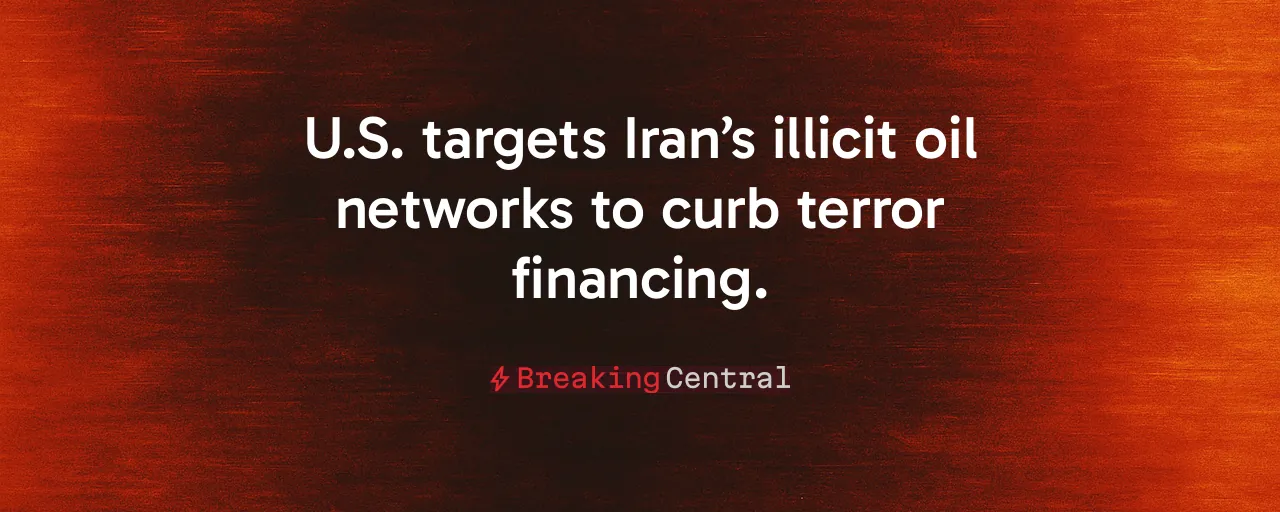A Strike Against Iran's Shadow Trade
The United States unleashed a fresh wave of sanctions on July 3, 2025, targeting Iran's illicit oil trade. Six companies and four vessels, accused of smuggling petroleum to fund Tehran's destabilizing agenda, now face severe penalties. This move, paired with Treasury's designations of shadow fleet operators, signals a renewed commitment to choke off the revenue Iran uses to bankroll terrorism and oppression.
A critical issue driving this action is Iran's ability to evade global oversight through covert oil sales. By blending Iranian crude with Iraqi oil, networks like the one led by businessman Salim Ahmed Said have funneled billions to Tehran. These funds prop up groups like Hezbollah and fuel missile programs that threaten allies like Israel and Saudi Arabia.
With Iran's oil exports climbing to 1.8 million barrels per day in early 2025, the need to act has grown urgent. Policymakers argue that unchecked revenue strengthens Tehran's hand, from proxy wars in Yemen to attacks on U.S. forces. The question is whether these sanctions can deliver the pressure needed to curb Iran's ambitions without destabilizing global markets.
Why Revenue Matters to Tehran's Regime
Iran's oil wealth is the lifeblood of its malign activities. Research shows that petroleum sales account for a significant chunk of the regime's budget, directly funding the Islamic Revolutionary Guard Corps and its Qods Force. These groups orchestrate proxy militias across the Middle East, from Lebanon to Iraq, sowing chaos that undermines regional stability.
During the 2019-2020 maximum pressure campaign, sanctions slashed Iran's exports by over half, forcing Tehran to scale back support for proxies like the Houthis. Congressional reports from 2025 cite intelligence linking oil profits to drone strikes on U.S. bases, underscoring the stakes of letting Iran's trade flourish unchecked.
Iran has adapted, however. Its shadow fleet, using tactics like ship-to-ship transfers and AIS spoofing, now moves 1.6 to 1.8 million barrels daily, mostly to Chinese refiners. This resilience demands a response that goes beyond symbolic measures, targeting the financial arteries that keep Tehran's agenda alive.
Sanctions as a Tool for Accountability
The July 3 measures, grounded in Executive Orders 13846, 13902, and 13224, aim to disrupt Iran's smuggling networks at their core. By designating entities like Said's companies and shadow fleet vessels, the U.S. seeks to make oil trade too costly for Tehran's enablers. Secondary sanctions also loom over Chinese refiners, who buy most of Iran's crude, signaling that complicity carries a price.
Advocates in Congress, particularly sponsors of the proposed Maximum Pressure Act, argue that these steps are long overdue. They point to 253 sanctions issued since February 2025 as proof of commitment, but warn that loopholes, like humanitarian waivers, risk diluting impact. Tightening these gaps, they say, is essential to ensure Iran faces real consequences.
However, critics raise concerns about global ripple effects. A full halt to Iran's exports could cut global oil supply by 2 percent, lifting prices by $5 to $10 per barrel. For American consumers, this means higher costs at the pump. Policymakers balance these risks, ensuring sanctions target Iran's regime and avoid undue impact on its people.
Learning From Past Pressure
The U.S. has a long history of using sanctions to counter Iran, starting with the 1979 asset freeze. The 1996 Iran Sanctions Act targeted oil investments, while the 2018 JCPOA withdrawal unleashed a wave of restrictions that crippled Tehran's economy. By 2020, Iran's GDP had contracted significantly, proving sanctions can inflict pain.
But pain alone does not guarantee compliance. Academic studies show that sanctions rarely force policy changes without diplomatic incentives. Iran's current dark fleet, larger and more sophisticated than in 2020, reflects its ability to adapt. This reality pushes advocates to call for bolder measures, like blacklisting all unsanctioned Iranian banks or sanctioning foreign ports servicing shadow tankers.
The challenge lies in enforcement. Detecting blended cargoes or tracking AIS gaps requires global cooperation, especially from maritime insurers and shippers. China's reluctance to comply remains a hurdle, but secondary sanctions could force Beijing's hand, as they did in 2019 when Chinese firms scaled back purchases.
Protecting Allies and Markets
For U.S. allies like Israel and Gulf states, Iran's oil revenue is a direct threat. Funds from smuggled crude have fueled Hezbollah's rocket arsenals and Houthi attacks on Saudi oil facilities. By targeting these networks, the U.S. signals unwavering support for partners facing Iran's proxies on the front lines.
Global markets also stand to benefit from a disciplined approach. Unchecked Iranian exports distort oil prices, undercutting producers like the U.S. and OPEC members. Sanctions, if enforced tightly, could stabilize supply chains and deter rogue actors from exploiting shadow fleets. The challenge involves avoiding overreach that spikes prices and hurts consumers worldwide.
A Call for Resolute Action
The July 3 sanctions mark a pivotal step, but they are only as strong as their enforcement. Policymakers resist calls for premature relief, which could embolden Tehran's aggression. Codifying measures like NSPM-2 through legislation ensures pressure endures, while expanding terrorism designations under E.O. 13224 keeps Iran's enablers on notice.
At the same time, the U.S. navigates the human cost. Sanctions have driven inflation and medicine shortages in Iran, hitting civilians hardest. Targeted carve-outs for humanitarian aid, monitored by neutral parties, could ease suffering without enriching the regime. Striking this balance is tough but necessary to maintain global support.
The fight against Iran's oil trade aims to deny a regime the means to threaten allies, destabilize regions, and pursue nuclear ambitions. By holding firm, the U.S. can protect its interests and demonstrate that Tehran will face accountability.
